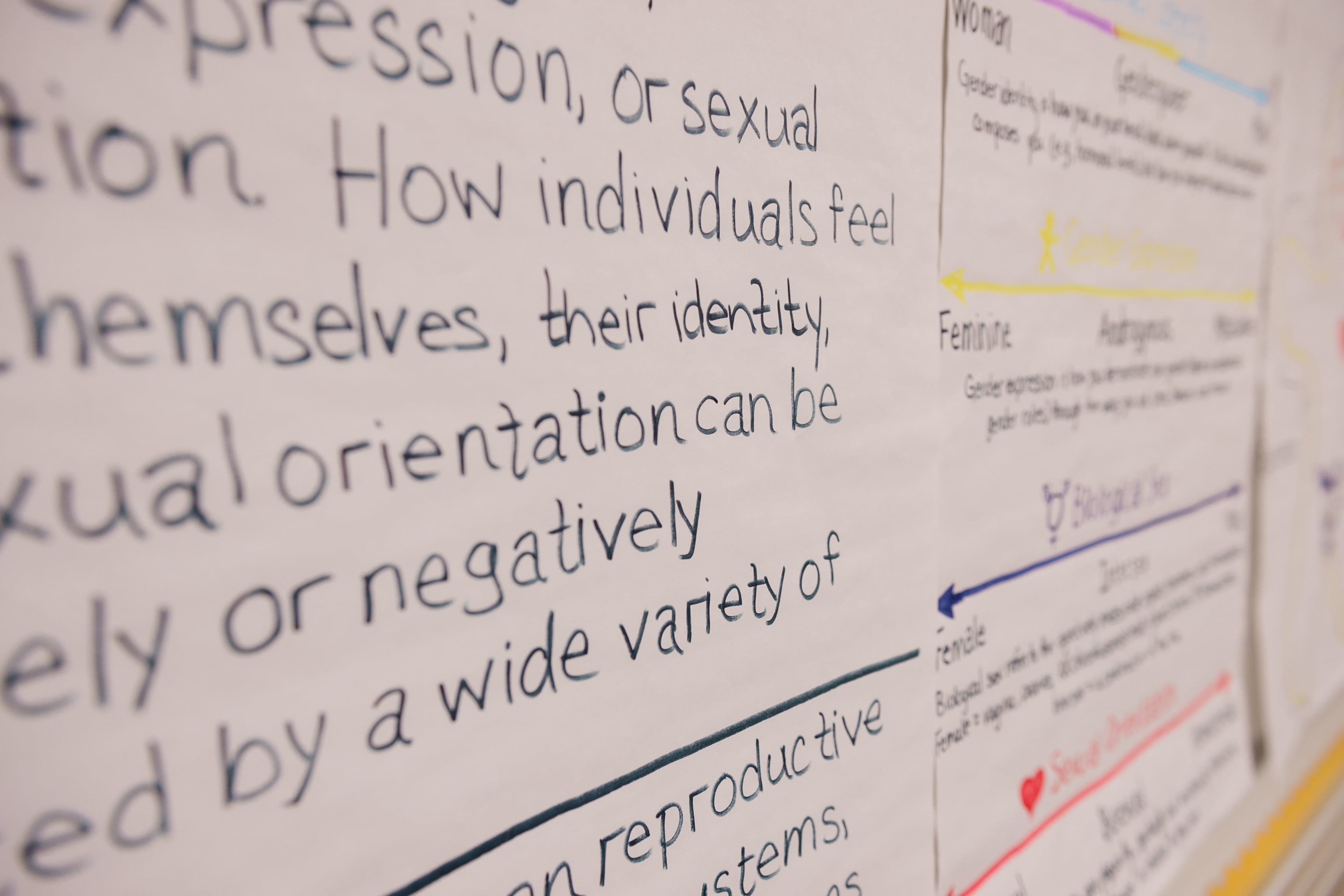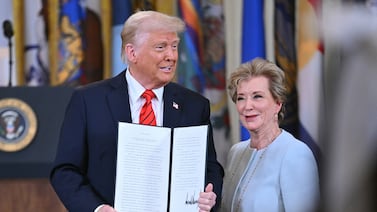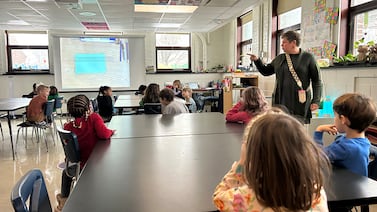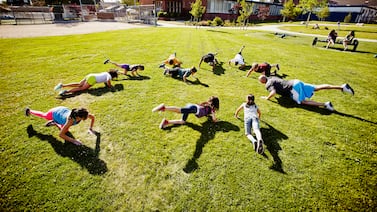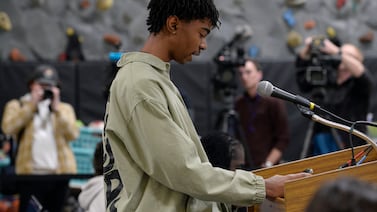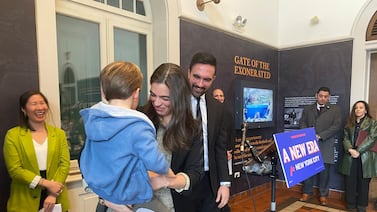Sign up for Chalkbeat Newark’s free newsletter to keep up with the city’s public school system.
Students with disabilities at American History High School are learning about sexuality, healthy relationships, and LGBTQ+ inclusivity among other health-related topics through a partnership between Newark Public Schools and Planned Parenthood of Metropolitan New Jersey.
The nonprofit organization, which provides sexual and reproductive health care and education across the country, is offering eight sex education workshops to students ages 18 to 21 in the transition program at American History. Parents do not have to provide consent for their children to participate in the workshops, according to Paul Brubaker, the district’s communications director.
The transition program teaches students with disabilities life skills and provides support as they leave the school system and head to the workforce and life outside school. Last month, the Newark school board approved a “memorandum of understanding” with Planned Parenthood, a formalized partnership that allows the organization to provide workshops on the introduction to sexuality, self-advocacy, puberty, self-esteem, and consent, among other topics at no cost to the district this school year.
Planned Parenthood’s staff “has the education, certification, training, and work experience in this area so as to be able to provide the services responsibly,” wrote Brubaker in an email to Chalkbeat on Wednesday.
With students having more access to information and social media than ever before, it’s vital to provide a basic education on sexuality and health care rights, said Jessica Preleski, senior director of education services at Planned Parenthood of Metropolitan New Jersey. For students with disabilities, it’s important to offer that education in a way they can understand and that allows them to ask questions, Preleski added.
“We really let people know that people with disabilities also have changing bodies,” Preleski said. “They have relationships and they even have sex. We try to simplify the presentations a little more and provide visuals so the understanding is there.”
Typically, Planned Parenthood’s workshops are for middle and high school students. At the middle school level, students learn about reproductive anatomy and hygiene and when they get into high school, those conversations also cover sex.
“We always say, it’s not a one-time conversation,” Preleski said.
At American History, the 45 students in the transition program will learn about a range of topics, including the difference between sex, gender, and identity as well as 20 options to prevent pregnancy, including abstinence, hormonal & barrier methods, and lifestyle choices. Last school year, the organization also provided workshops to American History students in the transition program, Preleski said. Every year, Planned Parenthood also provides high school and transition program students at New Jersey Regional Day, a district school for students with disabilities, with their sex and health-related education workshops.
But before Planned Parenthood enters any classroom, they speak with school and district leaders to learn more about the type of instruction their students may need. The school’s administration also notifies parents of the program and topics that will be covered. Planned Parenthood met with team leaders at American History to understand what instruction works for their students and what information they need.
“Why were we requested? What is it about healthy relationships that students need to know?” Preleski said. “Did something happen? Do they have questions about consent?”
From there, school districts receive a copy of the lesson plan in which Planned Parenthood lays out its objectives and connects them with state learning standards, Preleski added.
Each lesson is 40 minutes long and interactive to ensure students are engaged, learning, and feeling safe. For students with disabilities at American History, the organization takes a different approach by providing more visuals with their lessons, printing out photos and placing them in front of students, and repeating things more frequently to support their understanding.
During the workshops, students can also ask questions anonymously by writing them down on index cards. At home, students can also use Planned Parenthood’s sexual health chatbot called Roo. The AI chatbot answers questions backed by professional health educators from the organization, Preleski said.
Sex ed lessons cover internet safety, consent, self-esteem
Planned Parenthood provides workshops to help parents and teachers understand health-related topics and support them in answering student questions. Planned Parenthood also attended the district’s Parent University program, where district parents, community leaders, and staff discuss a wide range of topics related to youth and schools. Last school year, the organization provided an overview for parents to navigate conversations about sex and also provided training to teachers during professional development days about creating safe spaces for students and handling tough questions.
“Sex ed has changed so much from when I got it. It used to be more prevention-based, and now, it’s also about internet safety, consent, and self-esteem,” Preleski said “It can be really hard and daunting but we want to provide the resources and help guide those conversations.”
During training, teachers have also raised questions about referring students to Planned Parenthood health centers and pregnancy options through safe haven laws in New Jersey. Under New Jersey’s Safe Haven Infant Protection Act, the state allows any individual to safely surrender an infant, legally and anonymously at any hospital, police station, fire station, ambulance, first aid, or rescue squad.
New Jersey laws also require schools to provide human sexuality instruction but each district is responsible for creating its own curriculum, provided they comply with learning standards set by the state’s department of education. The state’s Comprehensive Health and Physical Education portion of New Jersey Student Learning Standards requires sex education programs to provide a “comprehensive range of high-quality information” in schools but also mandates that curricula stress abstinence as the most reliable means of avoiding sexually transmitted diseases and pregnancy.
The state also has several laws that allow minors to either receive certain services without prior parental consent or authorize them to consent for specific health care services, including some preventive services, according to the New Jersey chapter of the American Academy of Pediatrics. In particular, state laws cover care for pregnant minors, STD care, HIV treatment, treatment for drug or alcohol use or dependency, outpatient mental health treatment, and services related to sexual assault. Young adults 18 and older are allowed to consent for their health care, but their rights may be limited if they are cognitively impaired and unable to give informed consent, according to the NJAAP.
As part of its partnership with Newark Public Schools, Planned Parenthood also provides a student internship program called Teen LINKS. The organization recruits and trains high school students to teach their peers about sex through school events or formal classroom visits. Students at Science Park and East Side High Schools and BRICK Gateway Academy are part of the Teen Links program.
“Sex ed isn’t just for youth, it’s for everyone,” Preleski said. “We’re constantly learning about issues and really enforcing that informed decisions really promotes safer decisions.”
Jessie Gómez is a reporter for Chalkbeat Newark, covering public education in the city. Contact Jessie at jgomez@chalkbeat.org.

